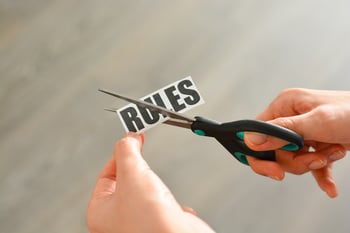
5 min read
Let’s start by being bold - I dislike the name “HR.” Human Resources. What does that even mean? At Reward Gateway, we prefer to call our HR professionals “People people.” (and I’m still not sure I like it).
And great, collaborative and transformational People people really do make a difference in creating (and retaining) an engaged team.
Regardless of what name you go by, here are eight pieces of advice to be the best you can, and get the “human” back in HR.
Know the business.
As an HR professional, it’s time to stop slipping into a reactive administrative function and start being proactive, business-oriented and enabling. It’s up to you to know the strategy, the direction, the business results, the pain points. Know what’s going on. You’re responsible for the company’s most vital assets - its people, so you should know how those people are going to deliver the objectives coming from the top - or if you need different people to do it!
Get out of that office.
Repeat after me: You don’t need an office. Really, you don’t. You don’t even need to be in the corner next to the meeting room “in case you need a private conversation.” There are other meeting rooms or coffee shops and it’s more important for you to take that laptop and go and sit in different places in your organization. My recommendation is to manage by walking around and hear the snippets of what’s hot and what’s not. Hear the managers talking to their teams. Help in problem solving. Be part of the team - and the solution.

Get rid of as many rules as possible.
Empower people to make great decisions. Why do companies have so many stupid rules, regulations and “policies”? I’ll tell you: It’s fear and lack of trust. Managers don’t trust their people to do the right thing. They create rule books just in case someone, somewhere, does something wrong. They manage 99% of their people based on a feeling that 1% may do something wrong. And HR is the master of “preventing unintended consequences” so the danger is you write a policy about something that’s never going to happen.
Be as transparent as you possibly can be.
Tell everyone as much as you can as soon as you can. Don’t ever say you don’t know, if you do know, just say “I do know, but I can’t tell you now, I will tell you as soon as I can.” Be honest about why people have left the organization. And don’t have “that look” on your face that says you know something but you’re pretending you don’t. There are no prizes for using knowledge as currency and even if there were, then HR shouldn’t even be playing the game.
Listen (a lot!).
It’s so simple, but not enough people do it. Ask questions and listen with a view to having your opinion changed; don’t make the mistake of thinking that you know it all.
Don’t do formal questionnaires and employee surveys if you’re not going to do anything about what people tell you and don’t wait months to give them feedback or results if you do. Why not just sit with a few different groups and talk to them? If you’re following rule No. 2 and sitting out in in the business, then you’ll have a sense of the temperature in the organization without doing another “climate survey.”
And before you make the excuse that you’re in retail or your teams are really spread out, you can get “in the business” by going out to stores - or use technology to virtually “meet” with people. If you really feel like you can’t engage with team members, connect with their managers, there are ways of making things work if you really want to.
Treat everyone with fairness.
Notice I said “fairness,”not “equality.” Thomas Jefferson paraphrased Aristotle when he said “there’s nothing so unequal as the equal treatment of unequal people.” So many times I hear the words “I treat everyone as I would want to be treated” or “I treat everyone the same; I don’t judge” as if they need a medal. Treating everyone as equal is probably one of the most unfair things that you can do. People are different, they need to be treated with respect, ethically and equitably and the differences between people should be recognized and valued as should their needs and circumstances when you’re working out the best course of action to take. Take the time to understand, don’t whitewash everyone with the same treatment in the name of fairness.
Stop making excuses for bad managers.
No one is too busy to have a regular catch up, give candid feedback or even answer a message from their direct report. They’re just not. Leaders can’t abdicate their responsibility - that’s failure in the role. Let’s start expecting our managers and leaders to be just that - great managers and leaders and if they can’t or won’t, let’s manage them - into a different role or a different company. We can’t afford to create a management deficit, where people are in a void, trying their hardest, without help, coaching and support - it’s not fair (see No. 6!)
Help create an organization that’s based on trust.
Let people know that it’s ok to not feel ok, that they can talk to you and you will help. That it won’t be perceived as a weakness. Let them know what information that they can share with you that won’t go anywhere else and what information you’ll need to pass on or do something about. Support a culture where people don’t think that they have to agree all the time, where they can give constructive criticism without getting their head bitten off. (And know that you might need to teach this as a skill - both the giving and receiving of criticism!)
Trust is a big thing - and whole books have been written on it, just starting to think about it will put you on the right track.
As with any career, perfecting it takes practice and effort. But by ignoring the impact that a good HR (People!) team can have on the overall business, you’re not doing service to yourself or your industry.
Tell me, what radical changes to your HR practice are you going to do to really make a difference?




